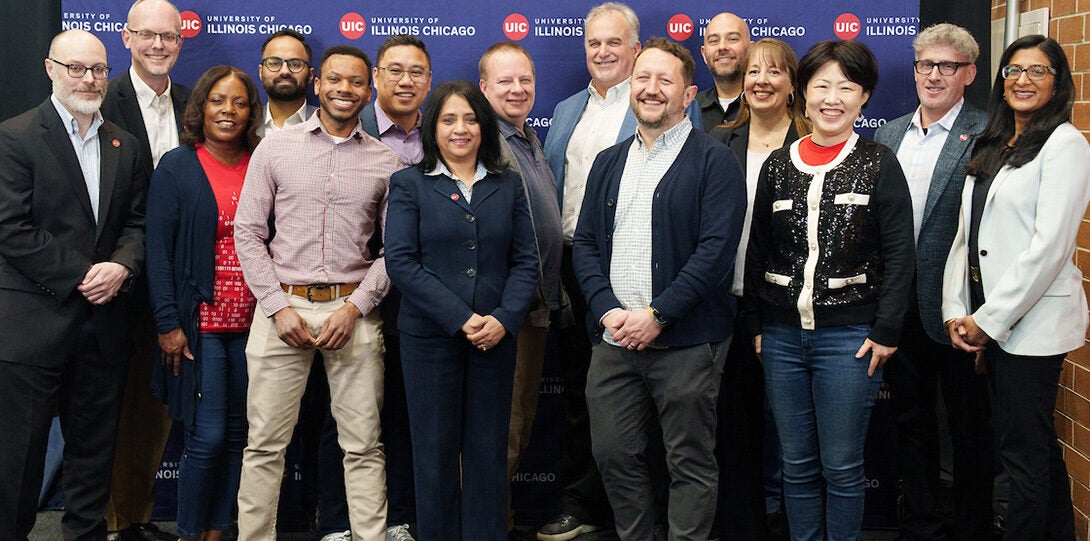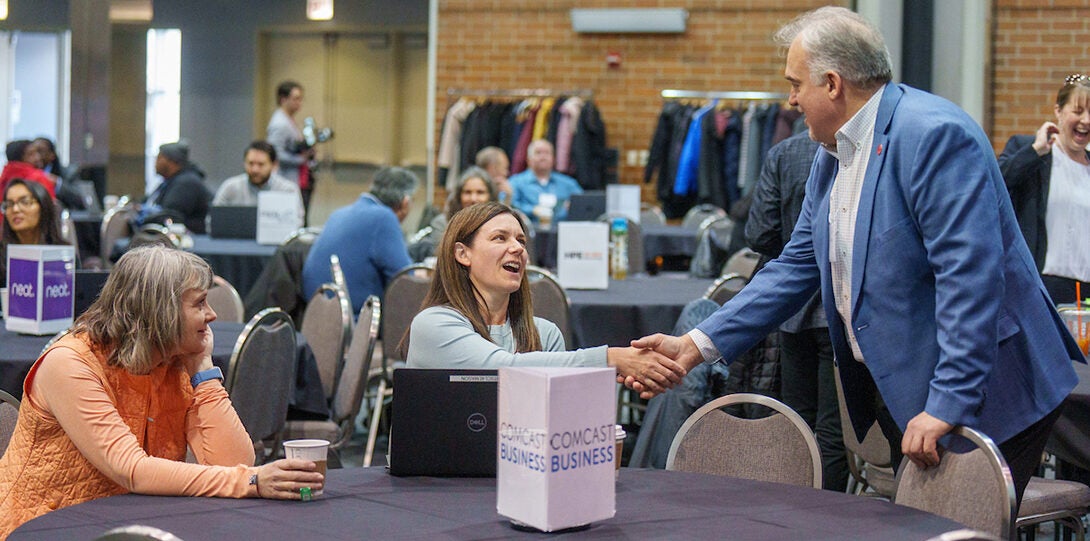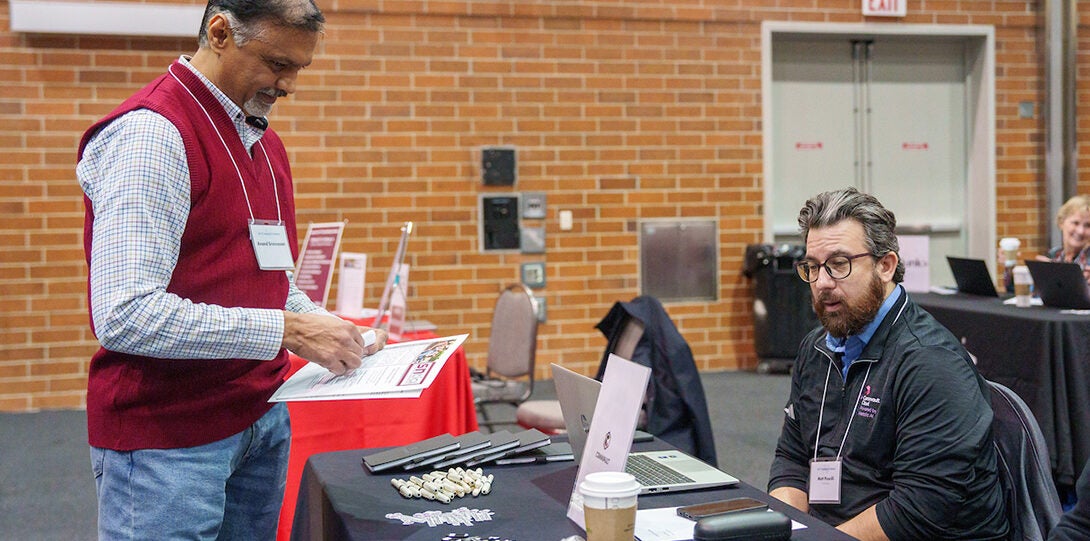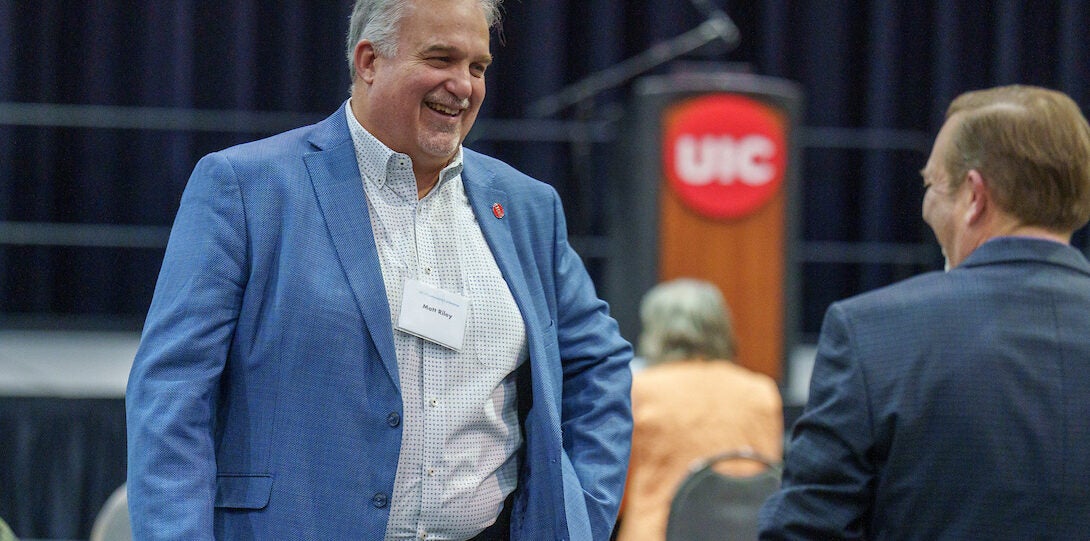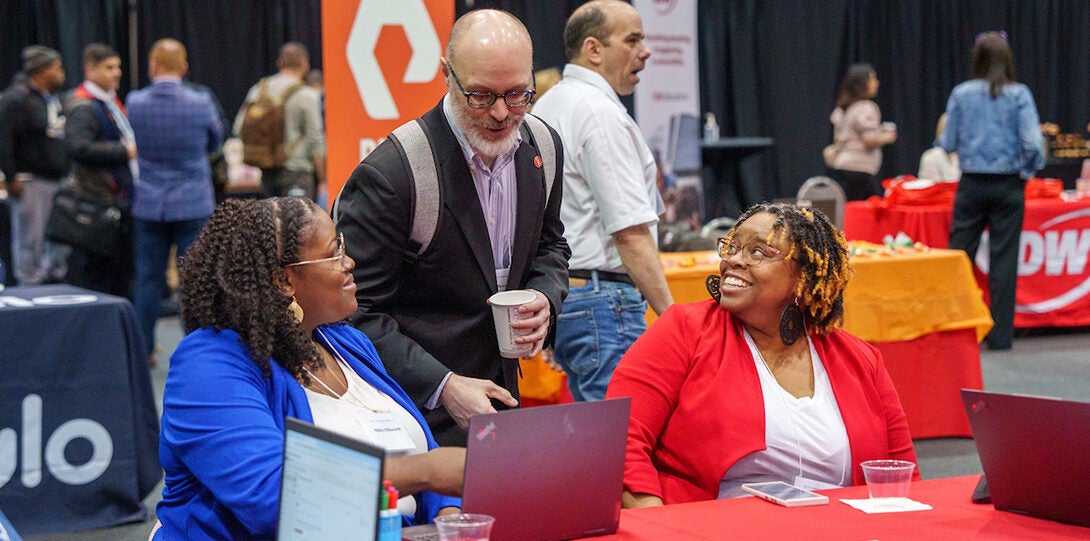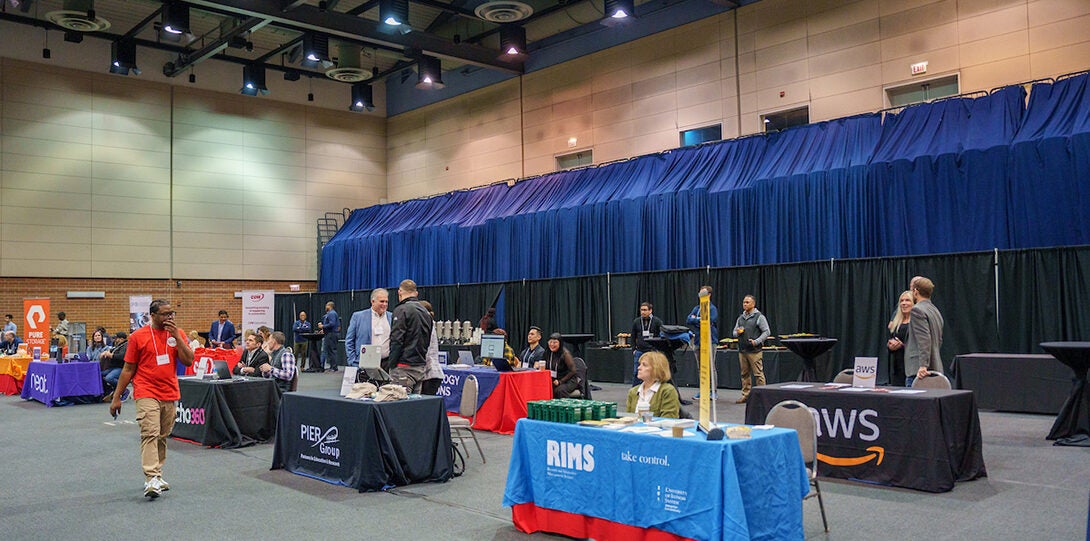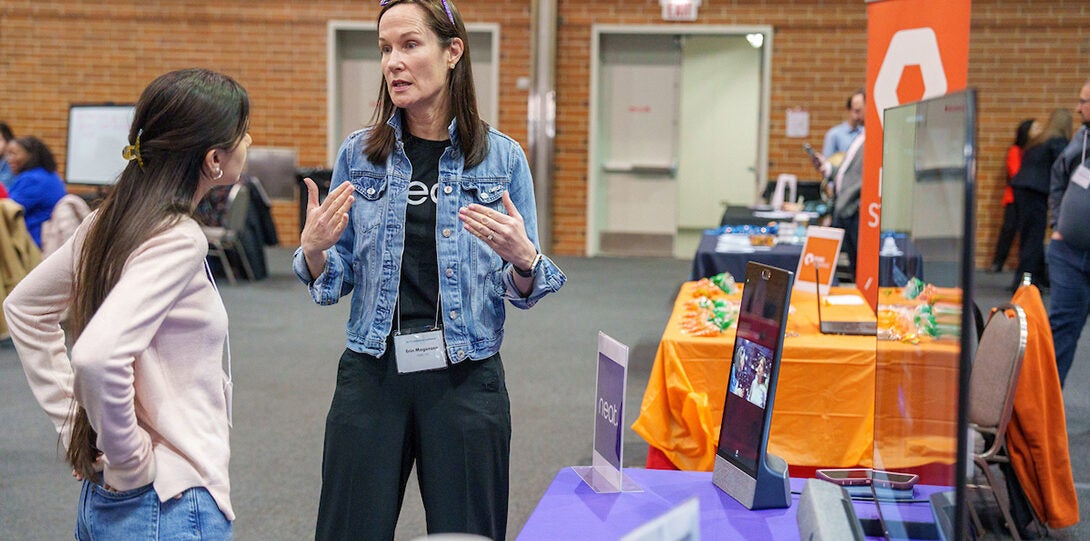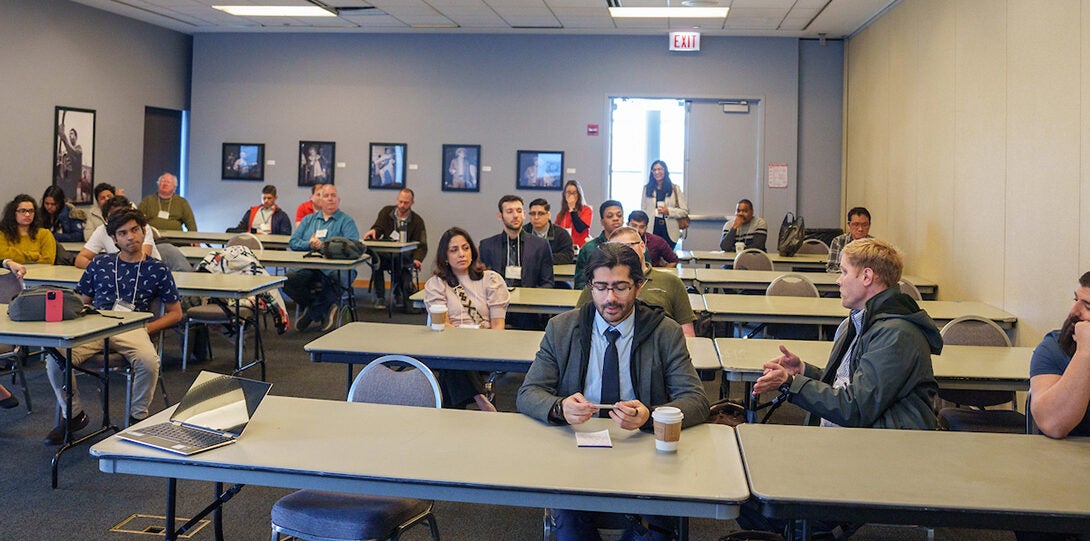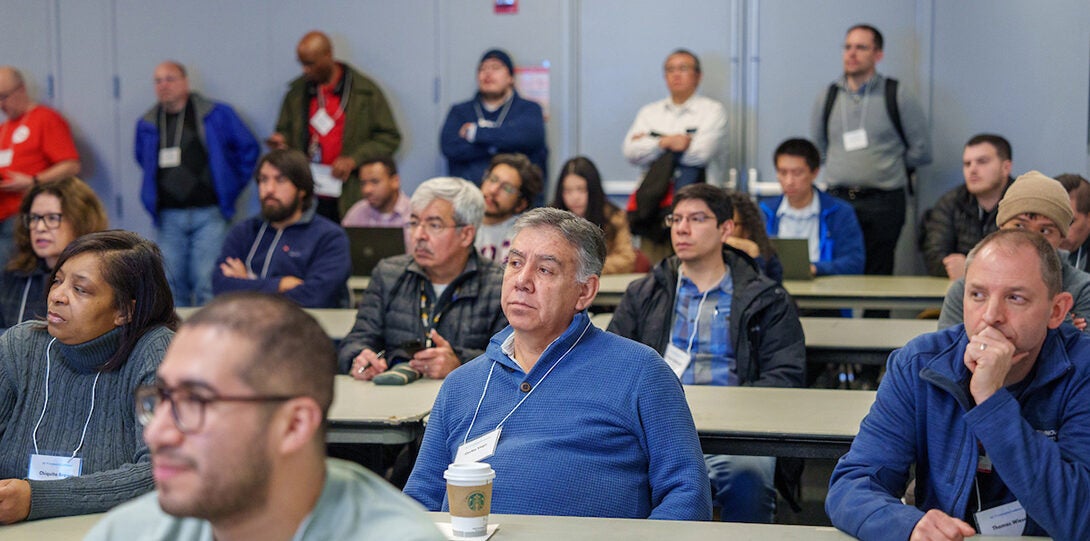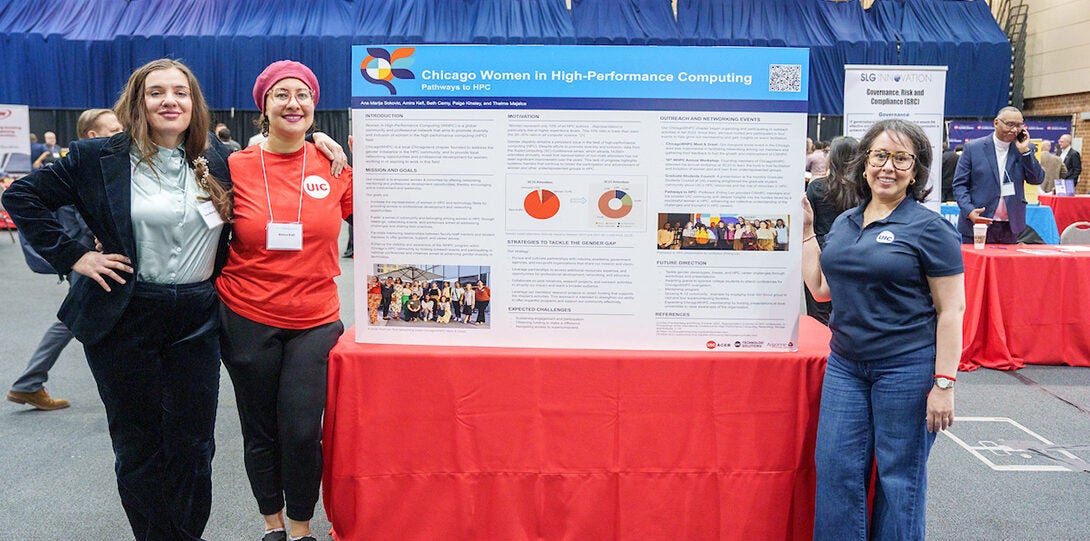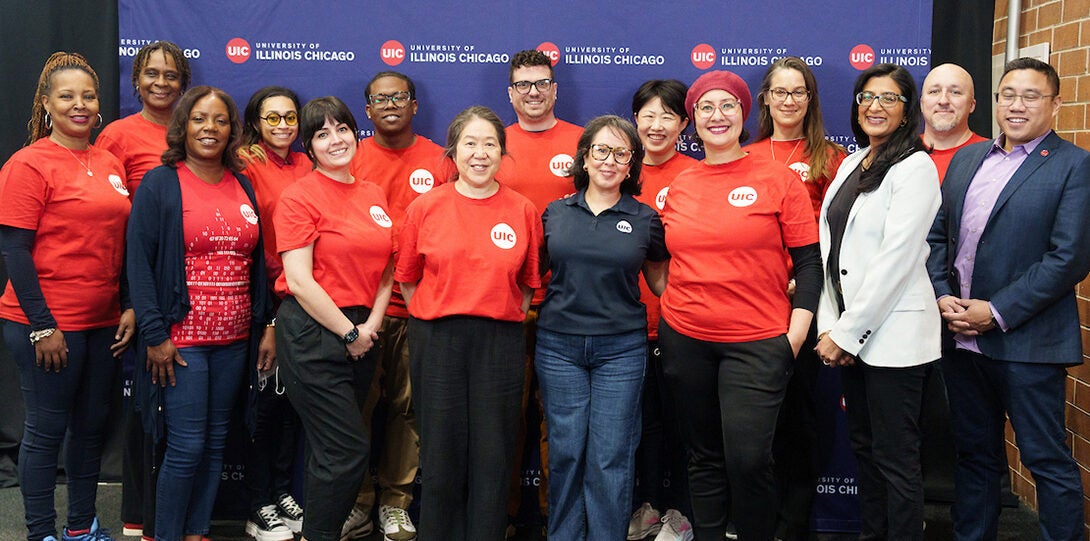Highlights from the 2024 UIC IT Community Conference: Empowering Minds, Advancing Research
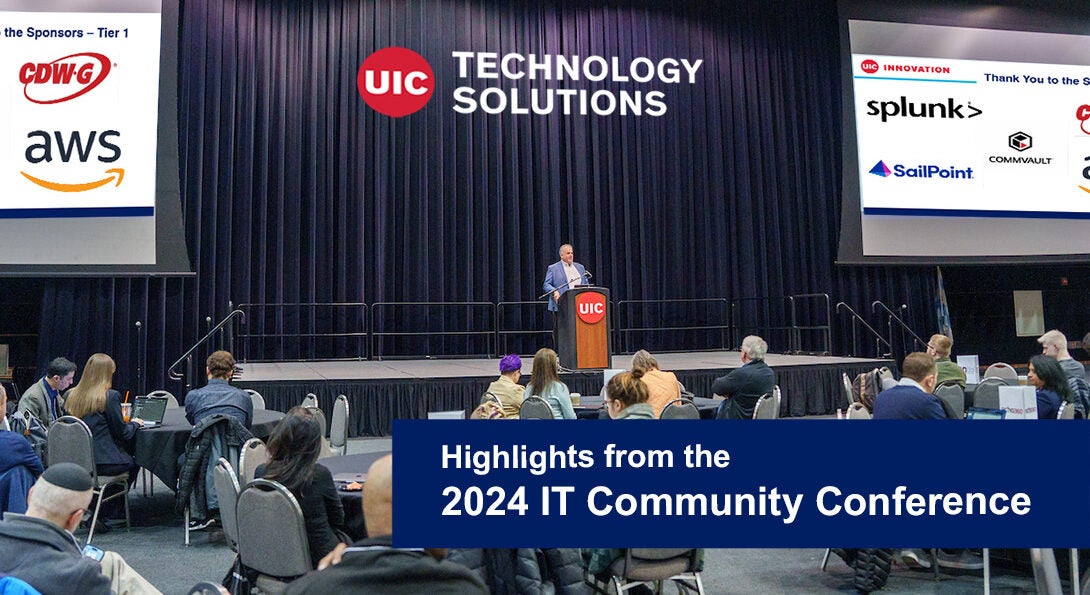
Introduction
The 2024 UIC IT Community Conference (ITCC) that took place on March 19th at the Isadore and Sadie Dorin Forum demonstrated our university's vibrant spirit toward innovation and collaboration. With over 300 UIC IT employees in attendance, the event served as a platform to celebrate and showcase the remarkable achievements of the IT community while chartering a course for the future.
With the theme "Empowering Minds, Advancing Research at the Edge of the AI Frontier," this year's conference focused on technological advancements, initiatives, and directives on campus that propel UIC forward. From new AI initiatives to transformative research endeavors and infrastructure enhancements, the event showcased the remarkable achievements and forward-thinking initiatives driving progress across our university. Below are influential moments from the 2024 IT Community Conference.
IT Community Conference Kicks Off
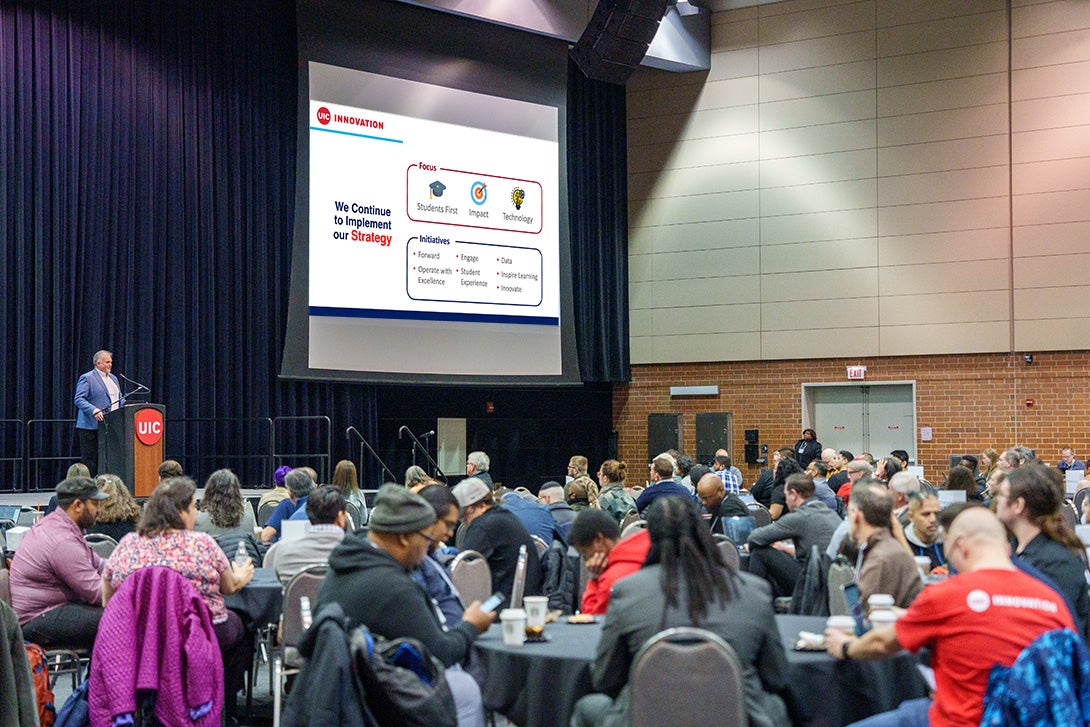
Matt Riley, Associate Vice Chancellor for Innovation and Chief Innovation Officer, kicked off the IT Community Conference, highlighting UIC’s IT Strategy and the driving forces behind our directives and initiatives. Our focus areas, Students First, Impact, and Technology, drive our vision and are supported by seven initiatives: Forward, Operate with Excellence, Data, Innovate, Inspire Learning, Engage, and Student Experience. Riley highlighted the Top 10 IT Efforts for the year that will modernize technology, enable innovation, and provide new solutions.
With a focus on modernization, initiatives like the network modernization project are set to elevate campus wireless connectivity, ensuring seamless access to digital resources for all. Modern endpoint security measures are being implemented to bolster UIC’s defenses and safeguard sensitive information against evolving cyber threats. The transition to Zoom Phone promises greater efficiency and flexibility in communication, empowering the UIC community to collaborate effectively and stay connected regardless of location.
Riley spoke of AI, its growing presence in higher education, and UIC’s strategy to adopt, implement, and integrate AI into our institution. “AI is here and impacting higher education, research, technology, and learning,” Riley said, “At UIC, our stance is to tread cautiously and carefully weigh AI and its impacts on students, academia, research, and our missions to understand the value, risks, and opportunities.”
More and more institutions are leveraging AI to take academia and research to new heights, and UIC is not behind. UIC is integrating AI tools to enhance productivity, collaboration, or innovation across the university community, such as Box AI, Zoom AI, Microsoft Copilot, and Grammarly, which were highlighted or showcased during the 2024 ITCC.
Matt Riley Quote
The Top 10 Project List is part of an ongoing effort to transparently share our progress towards UIC’s technology goals and how our UIC investments in technology are being managed. These strategic endeavors underscore UIC’s commitment to leveraging cutting-edge technology to foster innovation and improve student experiences.
| Associate Vice Chancellor for Innovation and Chief Information Officer
AI Integration in Academia: Empowering the UIC Community
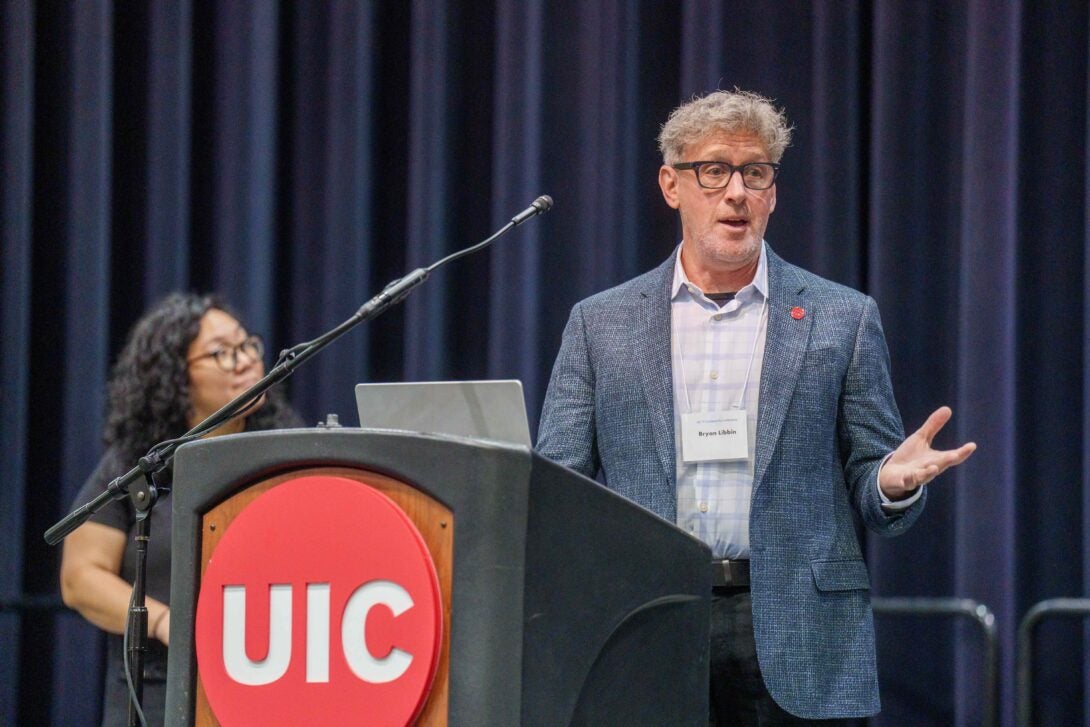
During AI Integration in Academia: Empowering the UIC Community, Bryan Libbin, Associate CIO of Academic Technology and Learning Innovation, and Cheryl McKearin, Manager, Academic Technology and Learning Innovation, explored the integration of Artificial Intelligence (AI) tools within the educational technology landscape of UIC.
Libbin shared how AI tools such as Blackboard Ultra’s AI Design Assistant, Grammarly, Anthology Ally, and Quivr, can enhance student and instructor experiences, create inclusive learning environments, and support innovation.
UIC’s strategy is to adopt technologies that improve the quality of education and augment the learning process. The technologies we adopt should magnify the teaching and learning process and facilitate better performance of educational systems, emphasizing effectiveness and efficiency. Below are AI tools UIC is adopting and/or piloting:
- Blackboard Ultra AI Design Assistant is an artificial intelligence-powered tool integrated into Blackboard Ultra. It provides course structure suggestions, auto-generated rubrics and discussions, and test question generation, helping instructors save time on course content creation so that they can focus on teaching.
- Anthology Ally is an AI tool designed to improve the accessibility of digital course content. It automatically checks content for accessibility issues and provides alternative formats such as audio, electronic braille, and ePub to accommodate diverse learning needs.
- Grammarly, currently piloted at UIC for one year, is an AI-powered writing assistant that helps individuals improve their writing by detecting grammar, punctuation, style, and clarity issues. It provides real-time feedback and suggestions to enhance the quality and correctness of written communication.
- Quivr is an AI knowledge management tool that allows you to upload, store, and search your knowledge inside a second “brain.” Quivr functions like your own personal AI assistant, drawing only from the knowledge base you contribute to your “brain.” UIC is planning to pilot this tool during Fall 2024.
Bryan Libbin Quote
Our team works collaboratively to effectively utilize digital applications and new technologies to address teaching & learning, departmental, and university-wide goals. We look forward to launching new tools and providing instructors with modern solutions that enhance teaching and learning experiences.
| Associate CIO of Academic Technology and Learning Innovation
Exploring AI Applications at UIC

Harnessing GenAI
The Harnessing GenAI workshop hosted by Computational Scientists, Ana Maria Sokovic and Amira Kefi explored the basics of Generative AI (GenAI) and its practical applications. During this workshop, Sokovic and Kefi shared the art of effective, prompt crafting and highlighted UIC’s GenAI tools. This session guided attendees on integrating GenAI into workflows and strategies, enhancing efficiency and innovation.
AI in Exam Writing
In AI in Exam Writing, Ben Schulz, Director of Assessment at the College of Pharmacy, shared how GenAI can assist instructors with enhancing exams by improving questions, using the correct medical terminology, and answer choices.
Bicycle of the Mind: AI for Accessibility
In a Bicycle of the Mind: AI for Accessibility, Szymon Machajewski, Associate Director of Academic Technology and Learning Innovation, explored how the AI tool Ally, enhances accessibility in education and ensures equitable access for students with disabilities.
Quote
As we embrace these transformative technologies, it emphasizes our commitment to excellence in education and research innovation.
| Associate Vice Chancellor for Innovation and Chief Innovation Officer
AI in Research

Artificial Intelligence and its impact on teaching and learning, and research was a trending topic at ITCC. The UIC research portfolio has steadily grown in the last five years and crossed the $500 million funding mark last year. The need for computing, data, software, cloud, and training will continue to grow at UIC. Himanshu Sharma, Associate CIO for Research Innovation, shared how recent investments resulted in new capacities and capabilities leading to the groundbreaking Chicago Computes program and Azure Cloud NIST compliance.
These programs will enable growth and position UIC on the right path to leverage AI in advancing research, encouraging innovation, and fostering collaboration.
Himanshu Sharma Quote
The Chicago Computes Program is not merely bridging gaps, it’s building a more equitable and collaborative future for researchers at UIC.
| Associate CIO for Research Innovation
State of the Network
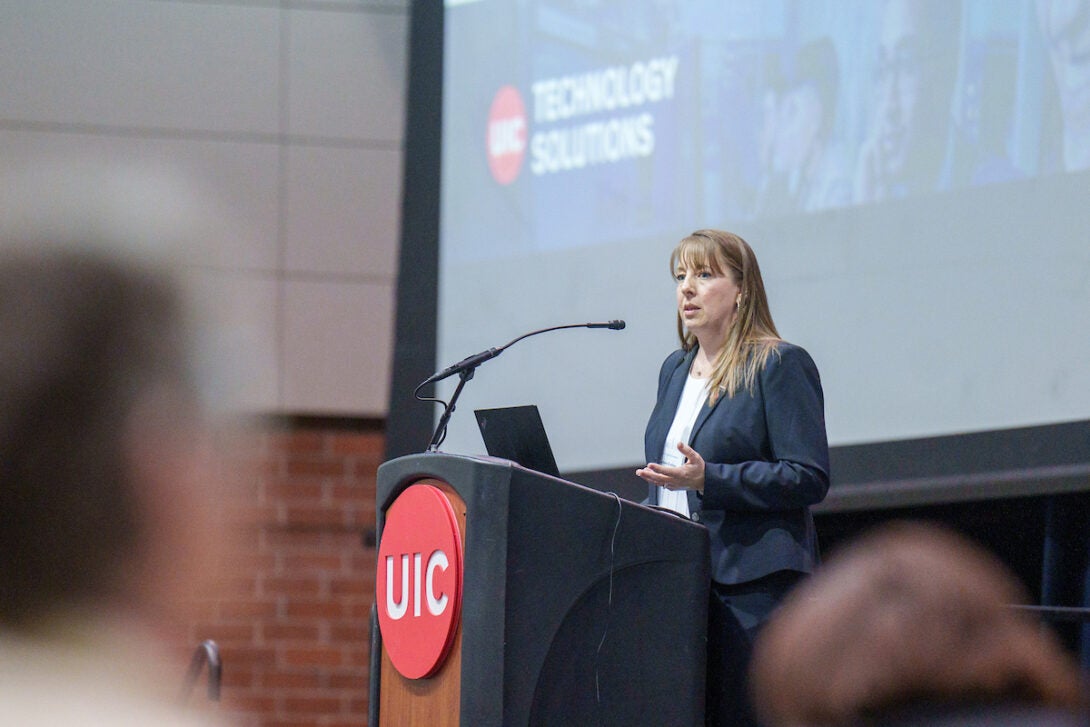
Jelene Crehan, Director of Network Engineering & Infrastructure; Malcolm McKay, Junior Core Engineer; Bill Lim, Lead Wireless Engineer; and Bill Sullivan, Lead VoIP Engineer from Technology Solutions, gave the State of the Network presentation, a one-year review of all the improvements made to the campus’ Network Infrastructure and roadmaps of upcoming projects and plans that will take UIC to new heights.
While the Networks team is working on numerous projects and plans, Crehan highlighted four key initiatives that transform technology and experiences at UIC:
- Startel Enhancements
Startel is the university’s emergency response system and can be identified by the 8-foot, blue-light bollards or posts seen throughout the East and West campus, as well as panic button devices installed in high-risk environments. Enhancements were done in 2023, including modernizing the technology and implementing additional features on the system to support the UICPD Dispatch Center, such as integrating video features, GPS coordinates of each bollard, and other security monitors. - Network Modernization
The Network Modernization consists of plans and roadmaps to upgrade the campus’ Wi-Fi and wired connections. Within the past year, significant enhancements have been made to buildings, including the Library of Health Sciences (LHS), Science and Engineering Labs East (SELE), and Plant Research Laboratory (PRL). This year, infrastructure improvements are planned for the Physical Education Building (PEB), the Education, Theater Music and Social Work (ETMSW) , and the Clinical Sciences Building (CSB). In addition, as part of a multi-year, multi-phase project, the Richard J. Daley Library’s (LIB) wired and wireless infrastructure is seeing a massive overhaul and upgrade. - Data Center Upgrades
A data center is a physical facility that the university uses to house critical applications and data. Data centers require significant infrastructure and environmental infrastructure to support the center’s hardware and software. The Roosevelt Road Building (RRB) started electrical and capacity expansion upgrades in 2023, with continued upgrades planned in 2024. The Benjamin Goldberg Research (BGRC) had its HVAC system updated in 2023 and has plans for new backup power and fire suppression upgrades in 2024. - Cross Campus Fiber Expansion
The cross-campus fiber expansion project refers to expanding fiber optic networks across the East and West campuses. This expansion will connect the campuses and provide high-speed, reliable, scalable fiber optic infrastructure. By extending fiber optic cables, the university will enhance connectivity, improve network performance, and support the increasing demand for data transmission and communication services.
Crehan Quote
The investment and support we’ve received have made it possible to support the projects crucial to our strategy and align with the university’s mission… Expanding, upgrading, and investing in our infrastructure supports the needs of our research, clinical, and academic communities.
| Director of Network Engineering & Infrastructure
Zoom Phone at UIC
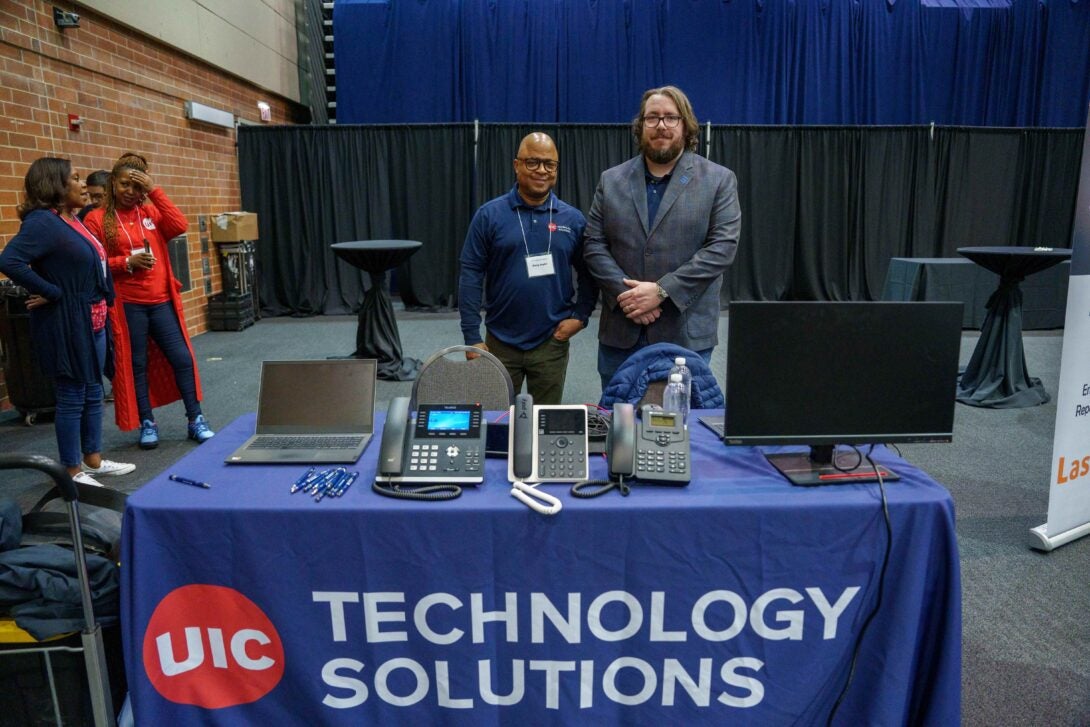
As part of the Operate with Excellence Initiative, the university voice communication system is being upgraded to Zoom Phone. Zoom Phone allows UIC phone numbers to be delivered to computers and mobile devices using the Zoom application. In cases where more traditional hardware may be required, Zoom Phone also supports a range of physical handsets.
The Networks team sponsored a table in the vendor room to showcase the new telephone technology and hardware device options. They also hosted the informational session, Zoom Phone at UIC: Preparing for the Upgrade.
During the session, Bill Sullivan, Lead VoIP Engineer at Technology Solutions, provided an overview of what UIC units can do to prepare for the transition. Sullivan emphasized the importance of understanding the new service and being aware of available resources, including a pilot program for departmental IT staff to test Zoom Phone before their departments are converted.
Empowering UIC IT Professionals
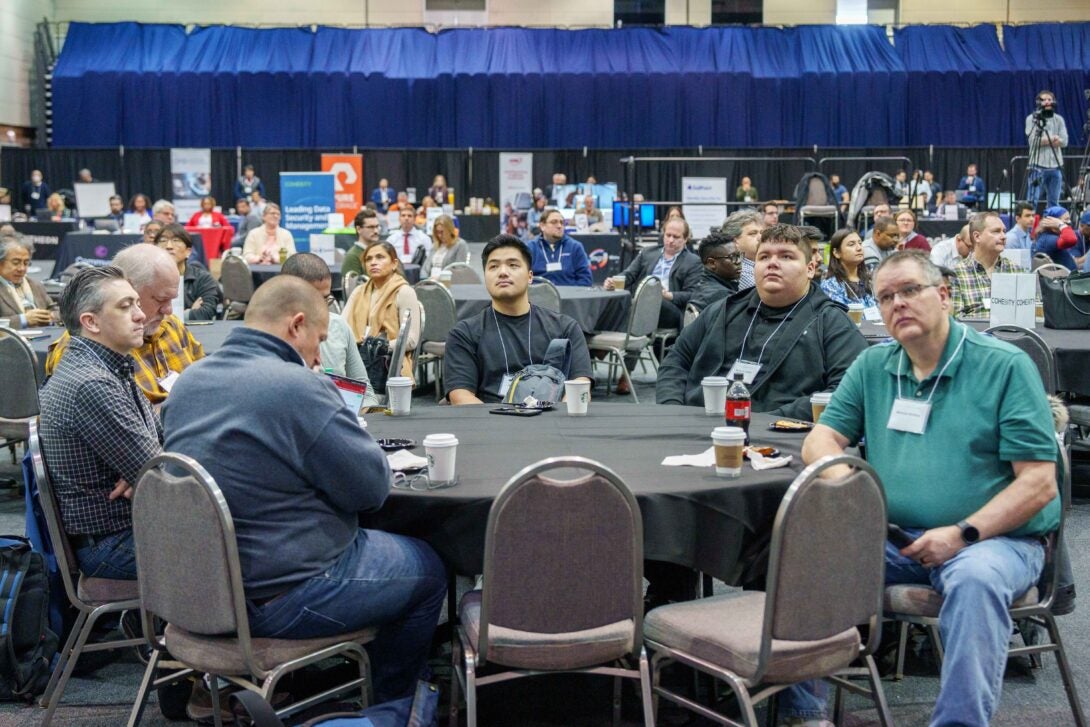
ITCC registrants were treated to a diverse array of sessions tailored to popular IT topics that provided valuable insights, practical tips, or actionable strategies, equipping attendees with the knowledge and tools needed to excel in their respective roles or contribute to advancing technology initiatives at UIC.
Team Dynamix (TDX) Tips & Tricks to Enable Efficiencies
In 2023, Technology Solutions assisted over 20 groups with transitioning to the TeamDynamix ticketing system. During the TDX Tips and Tricks session hosted by Anthony Marino, Director, Client Experience, learn about some of the most powerful features of TDX, including Automation Rules, workflow, Task Templates, and Ticket Templates. Marino showcased success stories on how these capabilities can enable efficiencies in your units’ work and improve client outcomes.
State of Software Development and Delivery
The State of Software Development and Delivery (SDD) session was an enlightening panel discussion. It gave registrants insights into the team’s growth over the past year, achievements, and their vision for the future. Radhika Reddy led the panel and shared the team’s accomplishments, upcoming student summer programs, and upcoming plans.
“We planted seeds a year ago, and now we are in the phase of nurturing our baby plants with three important milestones,” said Radhika Reddy, Director of Software Development & Delivery. First, we are bringing more of our Innovation Day ideas onto our official roadmaps. Through innovation days, we are implementing more GenAI skills and creating applications to benefit the University. Second, we aim to build a future sustainable portfolio by working on high-impact and high-return-on-investment tasks such as re-engineering Search on our flagship site, https://www.uic.edu. Lastly, we are creating stronger relationships throughout the University and system to provide an inclusive developer experience for FTEs to COE students.
Introduction to UIC Research Data Storage & Transfer Tools
ACER shared three new research data storage services, Research Data Rapids, Research Data Lake, and Research Data Glacier, during A Bucket for Everyone and How to Fill it – Introduction to UIC Research Data Storage & Transfer Tools. Each service serves a specific storage need for the UIC community and integrates seamlessly with Globus, a data management tool kit that facilitates the secure transfer of data across many different platforms. The talk covered the new storage options and demonstrated their versatility for data-intensive research workflows and more!
That's a wrap!
As we reflect on the IT Community Conference, we are inspired by the collective passion and dedication of the IT community to transform experiences and help shape a brighter future for all. Thank you to all registrants, vendors, speakers, hosts and volunteers for contributing to another successful IT Community Conference, and we hope to see you next year.
